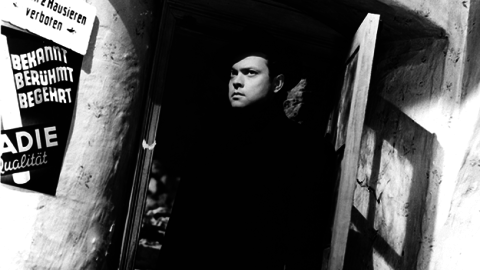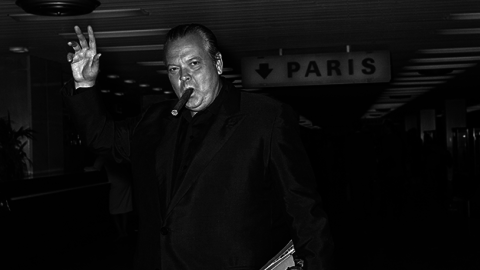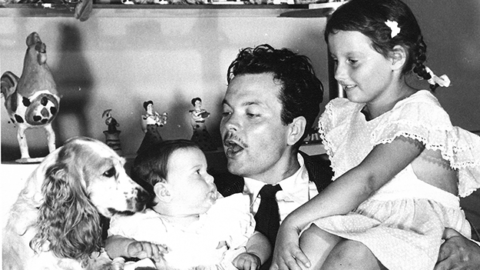Deep Focus: Chimes at Midnight
Get thee to Gloucester, Essex. Do thee to Wessex, Exeter.
Fair Albany to Somerset must eke his route.
And Scroop, do you to Westmoreland, where shall bold York
Enrouted now for Lancaster, with forces of our Uncle Rutland,
Enjoin his standard with sweet Norfolk’s host.
Fair Sussex, get thee to Warwicksbourne,
And there, with frowning purpose, tell our plan
To Bedford’s tilted ear, that he shall press
With most insensate speed
And join his warlike effort to bold Dorset’s side.
I most royally shall now to bed,
To sleep off all the nonsense I’ve just said.
—”So That’s the Way You Like It,” in Beyond the Fringe
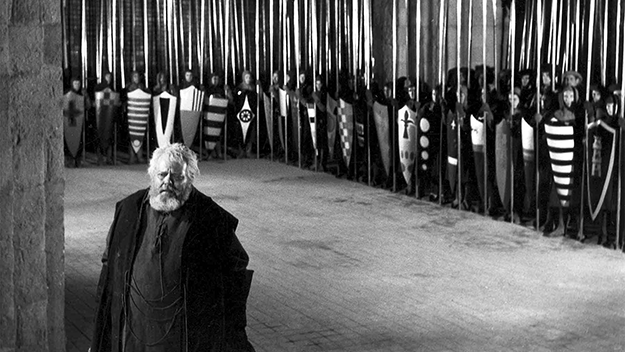
Orson Welles’s Chimes at Midnight, aka Falstaff, in its profound and tragicomic way, does for Shakespeare’s historical dramas what Beyond the Fringe (Jonathan Miller, Peter Cook, Alan Bennett, Dudley Moore) do in the hilarious burlesque “So That’s the Way You Like It.” It illuminates them with brilliant irreverence and gusto. Welles views kingly power plays and era-defining battles as cruel, breathtaking absurdities, just as soul-killing for Henry IV (John Gielgud) and his son, Prince Hal / Henry V (Keith Baxter), as they are murderous to that zesty rebel, the warrior’s warrior Hotspur (Norman Rodway).
Falstaff (Welles), the surrogate father of Hal’s supposedly misspent youth, becomes an existential champion for refusing to meet the demands of bloodless respectability and ostensibly patriotic combat. In this magisterial mash-up of Richard II, Henry IV Part I and II, and Henry V (with a dab of The Merry Wives of Windsor), Welles gives Falstaff—the embodiment of Merrie Olde England—the stature and freshness of a modern hero. Welles doesn’t alter the man he always called “Shakespeare’s greatest character,” but he does shift our perspective on him with exhilarating ease and dramatic/cinematic genius.
This rotund knight’s life plays out as an extended improvisation, fueled by appetite and wit. He personifies a golden age of bonhomie that will be ruined by the reign of the Plantagenets. With Chimes at Midnight it is no longer enough to say that Falstaff provides the counterpoint to Henry IV and to “Harry” Hotspur (aka Henry Percy). His disdain for both of them is the point—his implicit repudiation of power divorced from sentiment (Henry IV) and his explicit mocking of military valor (Hotspur).
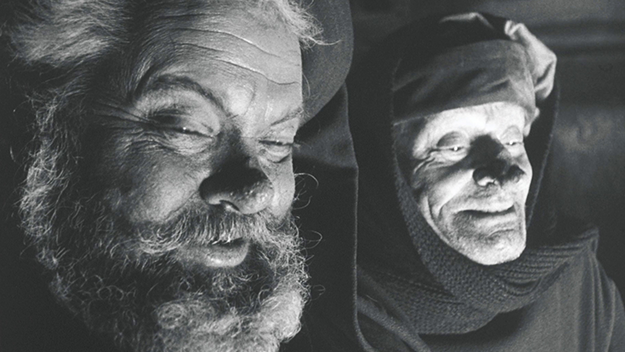
Welles embodies Falstaff’s good nature with a capital G and N. He considers Falstaff’s unfettered vitality to be the ultimate good, and his relish for wine, women, and wrongs (mostly minor wrongs, to be sure) as England’s last claim to natural living. By contrast, as Falstaff and Welles see it, Henry IV is cripplingly calculating. When Falstaff and Hal take turns impersonating the King, Falstaff claps a saucepan on his head for a crown and tells the Prince: “That thou art my son, I have partly thy mother’s word, partly mine own opinion, but chiefly a villainous trick of thine eye and a foolish hanging of thy nether lip that does warrant me.” Welles’s Falstaff pulls off a wicked impersonation of Gielgud’s Henry IV (as does Baxter’s Hal). But the jolly tilted angle of the saucepan is a pure (that is, impure) Falstaffian flourish.
Later, as Hal prepares to vanquish Hotspur at the Battle of Shrewsbury, Falstaff addresses his bracing putdown of honor to the future Henry V: “What is honor? Air—a trim reckoning. Who hath it? He that died a Wednesday. Doth he feel it? No.”
Welles is magnificent as Falstaff. He gives you both the surface playacting and the bedrock emotion behind his self-describing litany of “sweet Jack Falstaff, kind Jack Falstaff, true Jack Falstaff, valiant Jack Falstaff, and therefore more valiant being, as he is, old Jack Falstaff.” By the time he gets to “banish plump Jack, and banish all the world,” you feel like leaping to your feet and stomping out your applause. Welles and Baxter conjure Falstaff and Hal’s shared affection and odd, contentious rapport. What Hal hides from Falstaff is that he is his father’s son, with a streak of Hotspur in him, too. In Baxter’s marvelous quicksilver performance, Hal, early on, turns away from his obese tutor in pleasure and explains that he will, when the time comes, reveal himself to be the virtuous Prince of his father’s dreams: “Yet herein will I imitate the sun, / who doth permit the base contagious clouds/to smother up the beauty from the world, / that when he please again to be himself, / being wanted, he may be wond’red at.” Under Welles’s direction, Baxter never lets this thread of covert ambition go slack. It supplies this simultaneously expansive and compact creation with escalating poignancy and suspense.
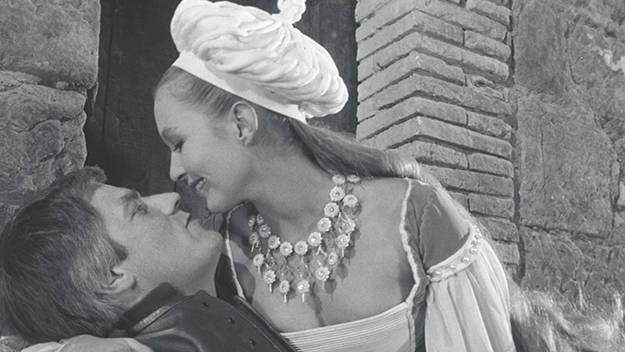
Made in Spain, on a schedule adjusted to fit the timetables of stars like Gielgud, Margaret Rutherford (as the hostess of Falstaff’s favorite Eastcheap tavern), Jeanne Moreau (as his prostitute lover, Doll Tearsheet), and Marina Vlady (as Hotspur’s wife), Chimes at Midnight suffers from inept syncing of the dialogue, especially in the early reels. But the movie has never looked or sounded better than it does in the current restoration (at least based on my teenage memory of the original 1967 American release).
It has in spades what’s missing from most recent Shakespearean adaptations: a rich, clarifying vision. Welles’s lucid framing of the Henriad as an Oedipal triangle, with Falstaff and Henry IV as rival father figures for Hal (and Hotspur as the son Henry IV wishes he had), is the opposite of reductive. Confident that they’re contributing to a solid, organic whole, his actors both dig into their characters’ “humours” and psyches and take wing in visionary flights. According to Baxter, “Margaret Rutherford used to say that working with Orson was like walking where there was always sunshine.” The cast’s joy at collaborating with Welles feeds into an extraordinary ensemble performance—extraordinary partly because each “guest star” shot at different times. Rutherford is rarely more engaging than when she oohs and aaahs over Falstaff’s mimicry, but during filming she never saw what she was applauding.
Gielgud had scored a stage sensation as the weak, imaginative Richard II. No ordinary director would have cast the man Kenneth Tynan described as “the finest actor on earth from the neck up” as the physically robust Henry Bolingbroke. But Gielgud and Welles create a daring revision of Henry IV as an increasingly frail and guilt-wracked monarch. His most eloquent musing—beginning with “O sleep, O gentle sleep, / Nature’s soft nurse, how have I frighted thee,” and ending with “Uneasy lies the head that wears a crown”—is both devastating on its own and a remarkable link to the poetic side of Richard II, the man Henry IV deposed.
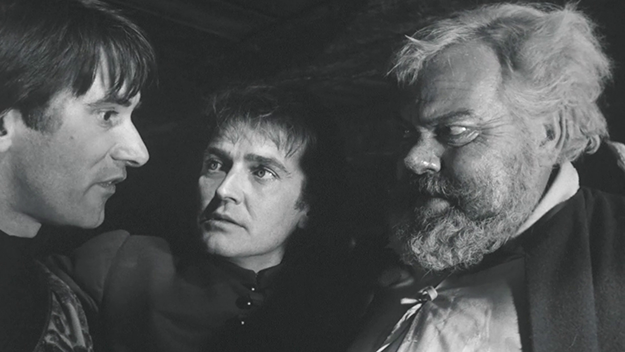
Rodway shows tremendous verve as Hotspur. The man lives at a pitch of bellicose exultation: Hal refers to him as “He that kills me some six or seven dozen of Scots at breakfast, washes his hands, and says to his wife, ‘Fie upon this quiet life! I want work.'” Welles takes that sally as his satiric cue for staging Hotspur’s farewell to his wife (Vlady). It’s an exuberant marital tussle. Lady Percy complains about his neglect of her while he struggles to address a call to action and dress himself after his bath. Welles punctuates the scene with rooftop trumpeters who grow in number from one to four as Hotspur spars with her and tries to make his getaway. But the director’s real triumph is the friction he generates between Hotspur’s dynamism and his Lady’s sensuality. In one flesh-tingling moment her rush of blonde hair fills the screen. Then she threatens to break one of Hotspur’s fingers.
Despite the budgetary limitations, the entire movie feels as if it were made in a state of play. Welles choreographs both his actors and his camera with a flow and an esprit that few contemporary directors can match despite their digital tricks and Steadicams. The Eastcheap tavern comes off as dizzyingly serpentine—a labyrinthine adult’s-only playhouse—as Hal tumbles in and out of its corridors and crannies to surprise and torment Falstaff. The lighting throughout is resonant and evocative: the sun enters the vaulted palace of the God-conscious King in eerie clerestory beams. The editing is bold and fluid. Even Welles’s stillest and quietest images are full to bursting with lyricism and emotion. The sight of a weary Falstaff wedged between chattering Justice Shallow (Alan Webb) and Shallow’s stuttering cousin Silence is like a superb, sedentary vaudeville routine.
Falstaff’s rejection of the forced piety of kings and the glamorized honor of soldiers underlies Welles’s Battle of Shrewsbury—a symphony, or, rather, a cacophony of martial chaos. Lances, axes, swords, maces, clubs and shields get used to pierce, cut, scythe, and bludgeon foes who soon lose visibility in fog and mud. The armies swing squads of archers into place as if they were medieval missile launchers; every rider registers as a horseman of the apocalypse. Yet unlike the carnage in Justin Kurzel’s Macbeth, the bloodshed here is sensitizing rather than numbing. You respond not merely to the gore and muck, but also to the conception behind it. Welles is depicting the lunatic history of combat from antiquity to 1403, in 200 shots. At his most audacious, he inserts shots of Falstaff, armored but unhorsed, capering blindly through the battlefield like an upright, overweight armadillo. It’s as if Welles is saying that it takes comedy, too, to convey war’s insanity.
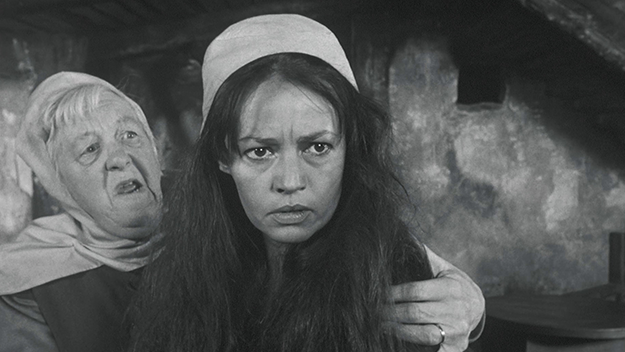
For a second I thought of the mist-choked Beyond the Fringe battle in “So That’s the Way You Like It,” which culminates with Peter Cook wailing “O saucy Worcester.” But then I said to myself, in awe, “No—O immortal Orson.”
Chimes at Midnight is playing at Film Forum through Tuesday, January 12.
Michael Sragow is a contributing editor to FILM COMMENT and writes its Deep Focus column. He is a member of the National Society of Film Critics and the Los Angeles Film Critics Association.



